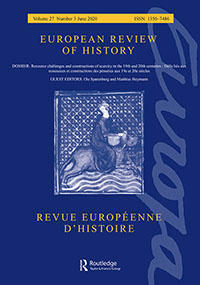Matthias Heymann publishes "Climate as resource and challenge: international cooperation in the UNESCO Arid Zone Programme"
European Review of History: Revue européenne d'histoire, vol. 27, no. 3, pp. 294-320 (2020)

Abstract
Perceptions of climatic challenges have changed significantly during the twentieth century. In recent decades, the question of global climate change received more attention than regional climatic challenges and the problems of arid regions. Historians have shown that persistent misconceptions and a lack of understanding of arid zones rooted in misguided colonial ideologies were propagated by United Nations (UN) initiatives such as the UNESCO (United Nations Educational, Scientific and Cultural Organization) Arid Zone Programme. Alarmist narratives of progressive desertification proliferated and put the blame on destructive local practices such as deforestation and overgrazing. This article investigates UNESCO’s interests in natural resources (section 1) and takes a closer look at the development and scientific elements of the Arid Zone Programme (sections 2 and 3). It argues that the Arid Zone Programme offered an effective framework that helped develop and spread new interdisciplinary research approaches to improve knowledge about arid zones. The myth of progressing desertification and misguided colonial expertise characterized much of its political rhetoric, but not its scientific work, which reflected balanced and more critical appraisals of out-dated colonial expertise. In its conclusion, the article suggests that broader contexts need to be taken into account to understand a resurgence of alarmist narratives of desertification such as shifting interests in climatology from local climatic issues to the global atmospheric circulation and a neglect of the climatology of arid zones.
